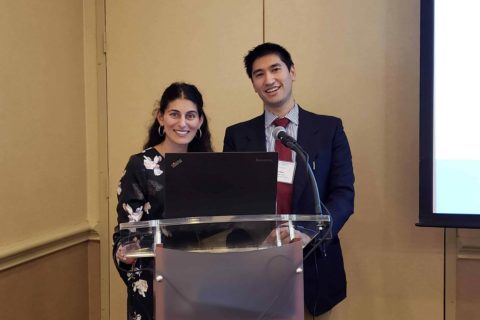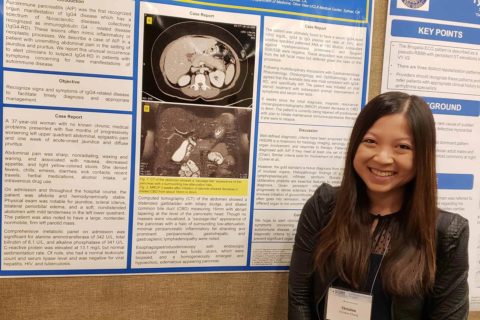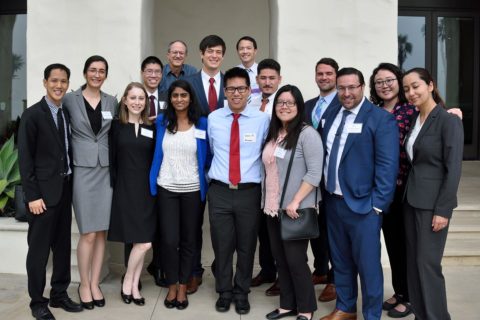Residents have opportunities for academic pursuits through elective time and integrated curriculum.
Medical Eduation Track
Do you envision a career in medical education?
The program invites second- and third-year residents to join the Medical Education Track. The elective curriculum consists of a series of didactic workshops to build the knowledge and skills of clinical educators. Here are just some of the topics.
- Learning and cognitive theories
- Building lesson plans
- Classroom teaching
- Teaching at the point-of-care
Candidates in the track also produce a capstone project—research or innovation geared towards medical education. Certification is offered to residents who complete the program.
This is a sampling of ongoing projects by current residents in the Medical Education Track.
| Resident | Project Title | Project Description |
|---|---|---|
| Christina Chung, MD | A Quick Guide for Residents Learning Medical Spanish | The goal is to create multimedia to provide residents with a toolkit for brief interactions with their patients. This is envisioned to be starting point to encourage learning more phrases. |
| Michael Kahn, MD | How to Teach the Teacher | Novel use of lesson plans in training medical educators in the academic medical community. |
| Joe Torres, MD | ICU Module for Ventilators | We envision a multimedia learning module to develop skill in management of mechanical ventilation in common clinical scenarios. |
Research
Clinical, basic science, and health services research are available in our program at both Olive View and UCLA. Many of our residents pursue research while pursuing competitive fellowships. Elective time can be used for research.
Here is a sampling of projects presented at Solomon Scholars Day at UCLA in June 2019.
| Name | Category | Title |
|---|---|---|
| Hernandez, Salvador | Clinical and Health Services Research | Seroconversion in Chagas Disease Patients Treated at a US Clinic |
| Jambulingam, Nikita | QI/MedEd | Resident Burnout and the Role of a Dedicated Wellness Curriculum |
| Kahn, Michael | QI/Med-Ed | Goal-directed clinical teaching: A movement to use lesson plans on the wards |
| Le, Long | Clinical and Health Services Research | A Higher Adenoma Detection Rate in Patients with Positive Fecal Immunochemical Test as a Quality Indicator. (Oral Presentation) |
| Lee, Yurhee | Clinical and Health Services Research | Adult-onset Still’s Disease with Migratory Polyarthritis Mimicking Acute Rheumatic Fever |
| Rosenstock, PJ | Clinical and Health Services Research | You Booze, You Lose… Sensation |
| Tang, Maxine | Clinical and Health Services Research | A Kiss from the Kissing Bug Makes the Heart Race: Myocardial Fibrosis Burden and Correlation with Cardiovascular Outcomes in Chagas Disease |
Quality Improvement
Quality improvement is a highly valuable, portable skill for modern-day medical practice. That is why we’ve integrated it into the curriculum. All residents partake in QI projects beginning in the intern year.
Here is a sampling of recent QI projects.
| Project Group | Project Aim |
|---|---|
| Pod A | Decrease Dermatology clinic appointment time by 10% |
| Pod B | Increase the rate of Hepatitis B screening to 60% and vaccination to 80% |
| Pod C | Increase usage of the lesson plan for medical students by 20% |
| Pod D | Reduce the risk of inappropriate aspirin prescription by 20% |
| Pod E | Increase naltrexone prescription for eligible patients with alcohol use disorder by 20% |
Professional Society Meetings
Owing to the abundance of interesting clinical cases and scholarly projects, many of our residents present posters and oral presentations at the conferences of local and national professional societies. Educational funds can be directed towards attendance at these conferences.
In addition, the residency program is very involved in local and national academic professional societies, including the American College of Physicians (ACP) and the Society of General Internal Medicine (SGIM).



